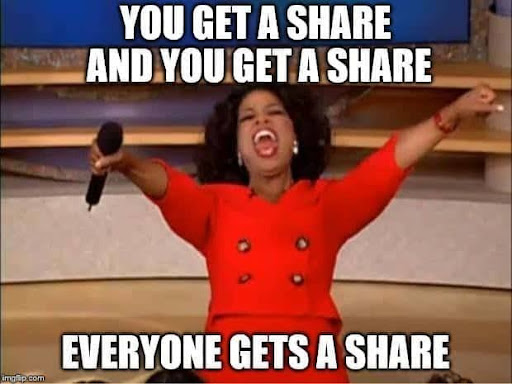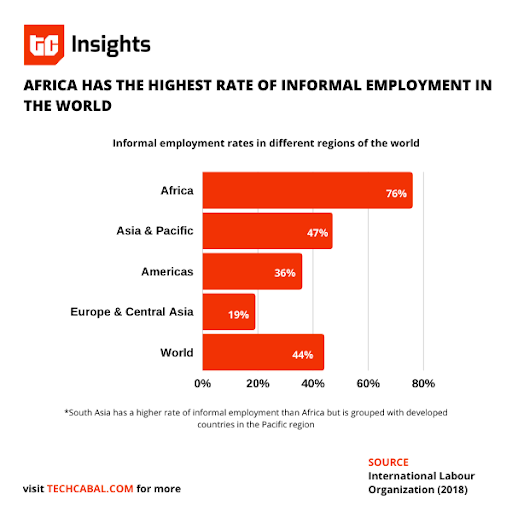
IN PARTNERSHIP WITH


Good morning ☀️ ️
Quick question: when will edtech innovations reach federal institutions?
This month, a number of colleagues at the Cabal have written exams at federal institutions in Nigeria, and it seems like a good number of things—from the registration process for exams to the actual writing— in those institutions could benefit from tech innovations.
For example, there are institutions with web pages that crash every time students log on to register for courses or accommodation. This isn’t a new problem, and there are solutions so it’s quite perplexing that year after year, students in these institutions still keep reporting the same problems.
In today’s edition
- MTN is selling $245 million worth of shares
- Countering climate change in East Africa
- TC Insights: Digitising Africa’s informal sector
- Tech Probe
- Events: Startup Huddle Lagos
MTN IS SELLING $245 MILLION WORTH OF SHARES

South Africa-based MTN Group has announced plans to sell 575 million shares of its most profitable subsidiary, MTN Nigeria, which went public in Lagos in 2019.
The transaction will see MTN Group rake in proceeds of about ₦101 billion ($245 million), based on MTN Nigeria’s (MTNN) current share price of ₦175.60. Hours after the announcement, the stock rose around 8% to ₦191.
But why?
Short story: Nigeria has too much wahala and it’s time to pay for it.
Long story: It’s all part of a bigger plan. The MTN Group announced earlier plans to sell down 14% of its current shareholding in the Nigerian unit. That will see its holdings in MTN Nigeria reduce from 76% to 62%.
While MTN Nigeria is the group’s largest and most profitable subsidiary, the telecom giant has had to deal with a number of billion-dollar disputes with the Nigerian government as well as faced significant macroeconomic challenges.
The share sale thus raises questions about the group’s intentions as it appears to be a gradual exit from the Nigerian market due to a lack of confidence.
Dig Deeper in MTN Group to sell $245m worth shares of Nigerian subsidiary.
COUNTERING CLIMATE CHANGE IN EAST AFRICA

“Africa, while currently responsible for a negligible amount of total global greenhouse gas emissions, is under significant threat from climate change,” said Kenya’s President, Uhuru Kenyatta, at the opening of Nairobi’s regional early warning climate centre last month.
Kenya is already feeling the effects of climate change.
The nation is in the midst of a prolonged drought, with 10 out of its 47 counties in a state of national disaster. According to experts, climate shocks like this one will become more common across Africa in the years to come.
Tech can mitigate global warming’s effects
Kenyan companies are already implementing climate change-focused technology, with the country’s leading electric power generation entity, KenGen, making a commitment to achieve 100% utilisation of renewable energy by 2030.
But, can tech be leveraged to save every sector?
Losing livestock
Climate change is also threatening Kenya’s livestock industry, which contributes around 12% to its national GDP. This year, eastern and southern parts of the country received 51% less rainfall than expected. And an estimated two million animals and $630 million in value could be lost from increased drought frequency by 2030.
Experts believe that the continent, as a whole, will need more than $300 billion over the next decade to develop strategies aimed at countering the effects of climate change.
Accept international payments from your customers in the USA, UK, Canada, and 60+ countries using Pay with Apple Pay.
👉 Create a free Paystack account to get started.
This is partner content.
TC INSIGHTS: DIGITISING AFRICA’S INFORMAL SECTOR
Pierre is a trader who lives in a town in Senegal. Back in the day, he relied on offline systems for his entire business process—word of mouth to get new customers, and cash to receive payments. However, with the advent of new technology, he finds his customers online and receives payment instantly using a mobile money service. He’s one out of the many people who contribute to Africa’s informal economy.
The informal economy is estimated to represent 72% of Africa’s economy and 38% of regional GDP. It accounts for 80.8% of jobs, and remains the backbone of economic activity within the continent.
The size of the working-age population in the region will increase by 224.0 million in 2030 and 730.4 million in 2050. Yet, it’s unlikely that a large percentage of this number will gain employment in formal sectors. The informal economy is their most realistic choice.
As a result, businesses and startups are creating digital systems and platforms to tap into it.
Prominent startups spearheading this shift include Paystack, Safeboda, Twiga foods, Flutterwave etc. While Paystack and Flutterwave help facilitate online payments, Safeboda offers ride-hailing services across the continent. Through its operations, it has been able to instill some level of orderliness within the motorcycle industry, an industry that is largely informal.
Twiga connects farmers with vendors so food produce can be sourced and delivered seamlessly across Kenya. It has been able to improve the livelihoods of farmers and vendors within the agricultural value chain, helping to reduce waste and lowering food prices.
Though these measures are not a complete antidote, they have armed these startups and businesses with valuable insights into the challenges faced by the informal labour market. As long as the informal sector represents a lion’s share of Africa’s economy, it’s only logical that activities within it benefit from digitisation and become standardised.
Get all our reports here and watch videos from our events. Send your custom research requests to tcinsights@bigcabal.com.
Join the Future Africa Collective – an exclusive community of investors who invest in startups building the future. With a $300 quarterly fee, you get access to invest a minimum of $2,500 in up to 5 high-growth African startups.
This is partner content.
TECH PROBE

Share your thoughts with us on Twitter and Instagram, or send a reply to newsletter@techcabal.com.
We’ll publish some of the most interesting responses on Friday.
EVENTS: STARTUP HUDDLE LAGOS
Last year, 84% of funding of African startups went to all-male founding teams while 3% went to all-female ones.
Startup Huddle Lagos is looking to change that. At its inaugural event later today, two female entrepreneurs will get the opportunity to pitch to an audience of investors, founders and ecosystem supporters.
Industry experts Elizabeth Pambuka, Olatowun Candide-Johnson and Umulinga Karangwa will share valuable insights and feedback with the selected founders.
Interested? Register here.
JOB OPPORTUNITIES
Every week, we share job opportunities in the African ecosystem.
- Amandla.mobi – Tech Manager – Johannesburg, South Africa
- British Council – Regional Head of Communications – Ghana/Kenya/Nigeria/Uganda
- United Nations Regional Service Centre – Telecommunications Officer – Entebbe, Uganda
- Reliance Health – VP, Online SME Sales, Product Lead – Africa (Remote)
- African Union –Technical Officer – Addis Ababa, Ethiopia
There are more opportunities here. If you’d like to share a job opening or an opportunity, please fill this form.
What else we’re reading
- MTN and Airtel have gotten “approval in principle” to launch mobile money services in Nigeria.
- Everyone is meting out lawsuits to Facebook and this one is for trademark infringement by a US-Based company called Meta Company.
- Why are Millennials called the burnout generation, and is there any truth to it?



























